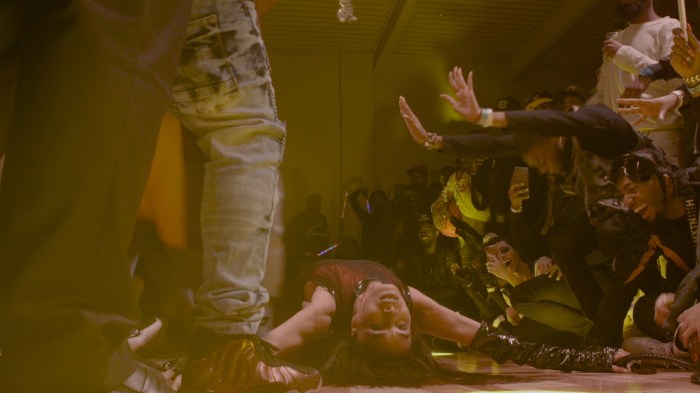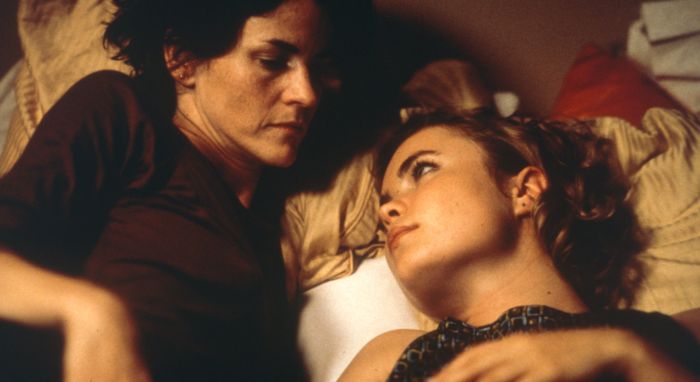French director Stéphane Brizé’s “The Measure of a Man” could have been made to illustrate the concept of “microaggression.” While avoiding physical violence –– and even emotional sadism on the director’s part –– it’s a parade of subtle humiliations for its hero, Thierry (Vincent Lindon). A 51-year-old who has been out of work for 20 months, his dilemma becomes most clear when he attends a class for the long-term unemployed. Other people critique his “performance” in a simulated job interview. They think he’s cold and distant. They don’t like the fact that the top buttons of his shirt are open.
While Thierry eventually finds a job doing security at the French equivalent of Walmart, it consists of a string of opportunities to humiliate shoplifters, many of whom are stealing out of poverty. He avoids acting like a jerk, but the drain on his soul still gets to him.
Lindon has worked with Brizé on three films. However, this time the director switched things up by surrounding Lindon with a cast of non-professional actors. In many respects, “The Measure of a Man” resembles what one might expect from a French film about unemployment. The camera is often handheld; when it’s not, it’s placed on a tripod for lengthy takes. It’s usually close to the actor’s faces, especially Lindon’s. “The Measure of a Man” falls close to the brand of neo-neo-realism patented by the Dardenne brothers, and for its first 20 minutes it seems like a mere knock-off of their style.
Vincent Lindon is a man facing, surmounting unemployment in Stéphane Brizé’s documentary-like feature
Then, Thierry and his wife go for rock’n’roll dance lessons, and Brizé devotes five minutes to their steps. They’re actually having fun, something rare for out-of work characters in European films. He has just as much as patience and interest in the couple learning how to glide to the 4/ 4 beat as he does with more dramatic material like Thierry’s Skype job interview (captured in a single take, and without showing the interviewer). “The Measure of a Man” insists on poor people’s right to pleasure, even as it shows how hard it is for them to partake of it.
Lindon fits among the non-professional cast seamlessly. While he may be a star in France, he doesn’t carry the same baggage for American audiences, which may help the film. A ruggedly masculine actor, he’s rarely crossed over into overt machismo. Were he American or British, one can imagine him bulking up and becoming an action star, a la Bruce Willis. Instead, he’s retained an everyman quality. Lindon is particularly convincing in working-class roles, although I know nothing about his real-life background.
Lindon is also willing to take chances. In Alain Cavalier’s “Pater,” he played the president of France in a film that kept alternating between “Veep”-style fiction and a documentary about its own odd existence. Perhaps his best performance was in Claire Denis’ “Friday Night,” where Denis objectified his body in a way that no straight male director ever would. The Metrograph is offering a prelude of four Lindon films as a teaser, including “Pater,” Denis’ “Bastards,” and Brizé’s “A Few Hours of Spring.”
By the time Thierry is employed again, it’s clear that Brizé has another influence on his mind: the late German documentarian Harun Farocki. For a long time, Farocki was best known for his anti-Vietnam War short “Inextinguishable Fire,” but he turned into a director of cold, dry films about institutions like ad agencies and firms that taught former East Germans how to adjust to life in a newly unified country. While he obviously felt some cynicism toward such institutions, he let his critique lay implicit.
The big-box retailer that finally hires Thierry could be the setting of a Farocki film. We see very little of the store itself, just the small room where he and his colleagues question shoplifters. They offer weak excuses –– one man says he was forced to steal an iPhone charger by a bully hanging around outside the store –– or admit that they stole items but claim they have no money.
Farocki approached fiction by filming real-life situations in which people learned how to become simulations of themselves. Brizé approaches documentary by using real people basically playing themselves in front of a cinematographer who had never worked on a fiction film before. To borrow a title and aesthetic from the Film Society of Lincoln Center, this may be a narrative feature, but it’s still the art of the real.
THE MEASURE OF A MAN | Directed by Stéphane Brizé | Kino Lorber | In French with English subtitles | Opens Apr. 15 | The Metrograph, 7 Ludlow St., btwn. Canal & Hester Sts. | metrograph.com































